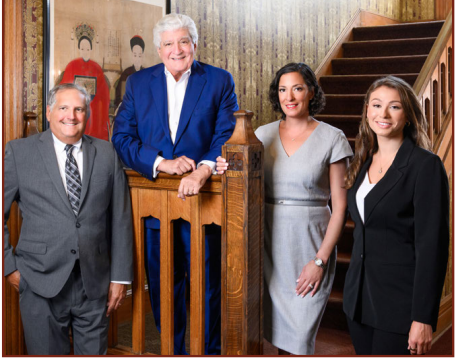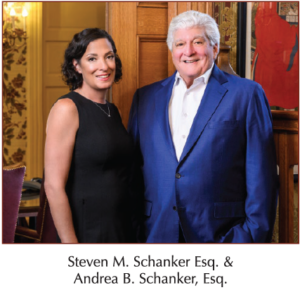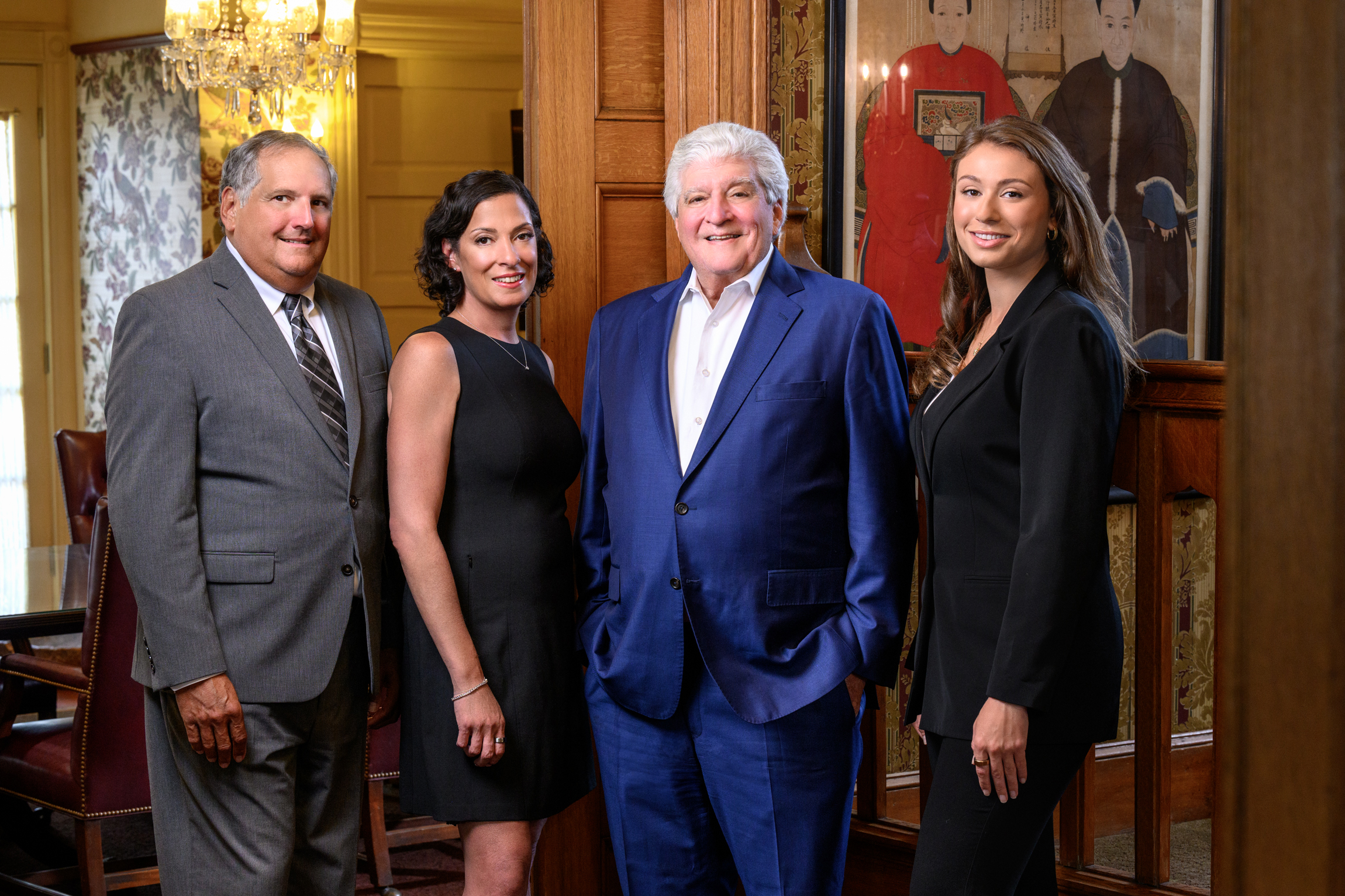Welcome Back
 Schanker and Schanker PLLC is a premier Estate Planning law firm. We offer legal services for sophisticated Estate and Gift Tax planning, Decedent Estate Administration and Probate services, Business Succession Planning, Charitable Giving, Special Needs Planning for persons with disabilities, simple Will planning, and all aspects of Elder Law planning including Medicaid planning and applications. Our website, www.schankerlawfirm.com, provides detailed information about our practice and the services we offer. It also is an excellent resource for articles of interest about Estate Planning and Estate and Gift Tax Laws. A copy of each newsletter will always be available on our website. Estate Planning is so much more than just tax planning. There is a considerable decision-making process. Schanker and Schanker PLLC has over 40 years of experience in counseling clients for their Estate Planning needs. As always, we encourage feedback from our readers. If there are any topics you wish for us to specifically address or elaborate on, please email me at: andrea@schankerhochberg.com
Schanker and Schanker PLLC is a premier Estate Planning law firm. We offer legal services for sophisticated Estate and Gift Tax planning, Decedent Estate Administration and Probate services, Business Succession Planning, Charitable Giving, Special Needs Planning for persons with disabilities, simple Will planning, and all aspects of Elder Law planning including Medicaid planning and applications. Our website, www.schankerlawfirm.com, provides detailed information about our practice and the services we offer. It also is an excellent resource for articles of interest about Estate Planning and Estate and Gift Tax Laws. A copy of each newsletter will always be available on our website. Estate Planning is so much more than just tax planning. There is a considerable decision-making process. Schanker and Schanker PLLC has over 40 years of experience in counseling clients for their Estate Planning needs. As always, we encourage feedback from our readers. If there are any topics you wish for us to specifically address or elaborate on, please email me at: andrea@schankerhochberg.com
Estate Planning Basics
If you have an Estate Plan, be sure to maintain your documents and be organized. A plan only works if it is in place and available. Plans do not exist in the “cloud” and certainly not from memory. It is fundamental that your documents are available for when they are needed however, if they are no longer available, the most likely consequence is crisis. We have worked on decedent estates where no one can locate the original Will and in some cases can only produce a photocopy with parts of the Will excluded. We have had cases where an Irrevocable Trust with substantial funding and/or life insurance is all together also missing. This results in Court proceedings and in some cases, a complete disregard of planning that is known to have been done however there is no paperwork to support it. We always give our clients specific instructions about where to maintain documents after they are signed as well as who should receive copies (for example, the Power of Attorney and Health Care Declaration). Lifetime advanced directives such as the Power of Attorney and Health Care Declaration serve to appoint an Agent(s) to act on your behalf while you are alive, but unable to communicate on your own behalf. These documents must be available in their original form. Of course there are exceptions and we have succeeded in getting a photocopy or PDF accepted, but that incurs extra delays and expense and there is no guarantee of success. Regardless of whether you have a traditional Last Will and Testament or not, a Probate proceeding in the Surrogate’s Court may be required before an Estate has access to administer the inherited assets. This is not a simple proceeding and certainly not a quick turn-around. Proper planning will avoid very bothersome blunders!  Business interests and income producing property also require specific planning. Regularly review your documents. Schanker and Schanker PLLC sends out reminders to all of our existing clients that they are entitled to a complimentary “annual review” meeting to ensure the planning is up to date and to perhaps incorporate changes when appropriate. There is nothing worse than a failed plan. A good plan works when it is available and up to date. Upon death, it is heartbreaking to add chaos at such a grievous time. Schanker and Schanker PLLC uses our 40-plus years of exclusively Estate Planning and Administration/Probate experience to do everything we can so that our clients have a good plan and keep that good plan intact.
Business interests and income producing property also require specific planning. Regularly review your documents. Schanker and Schanker PLLC sends out reminders to all of our existing clients that they are entitled to a complimentary “annual review” meeting to ensure the planning is up to date and to perhaps incorporate changes when appropriate. There is nothing worse than a failed plan. A good plan works when it is available and up to date. Upon death, it is heartbreaking to add chaos at such a grievous time. Schanker and Schanker PLLC uses our 40-plus years of exclusively Estate Planning and Administration/Probate experience to do everything we can so that our clients have a good plan and keep that good plan intact.
Business Succession Planning
 Frequently, the family business is the most valuable asset of your estate, yet is often not planned for. Whether you own interests in a small business with one other Partner/Owner or a larger business with several interest holders, there will always be some point in time where “what next” must be addressed. This could be because of a falling out, a disability (temporary or permanent), death or retirement. What happens next is the question? What happens to that person’s ownership interests? Is it reabsorbed by the entity? Is there a buy-out plan? How do you value those interests? Where does the funding for a buy-out come from? What is the timing of it all? Who has the right to take over those interests? These are all essential questions that if not addressed in a ”plan” then must be later addressed upon the occurrence of any of the events described above. The plan is created as a contractual agreement between the owners/partners/shareholders. Common names include Buy-Sell Agreements, Shareholder Agreements and Operating Agreements. All of these agreements create terms of transferability of ownership interest by virtue of gifting, inheritance, and buy-outs. The agreement will set forth business valuations methods and buy-out protocol. There are many small to mid-size family-owned businesses however, there also is the blended business ownership which consists both of family members and non-family members. If I own a business and my sister is a Partner with me along with another Partner who is not a family member, whose family has no involvement in our business, what happens when this Partner passes away. Now suppose this Partner has no estate plan whatsoever. Now what? It becomes a major estate administration issue. Moreover, the IRS may very well become involved. Take the time to closely consider the planning or even lack of planning you may have under these circumstances and come for a complimentary initial consultation to open the door to discuss these very real and very significant issues.
Frequently, the family business is the most valuable asset of your estate, yet is often not planned for. Whether you own interests in a small business with one other Partner/Owner or a larger business with several interest holders, there will always be some point in time where “what next” must be addressed. This could be because of a falling out, a disability (temporary or permanent), death or retirement. What happens next is the question? What happens to that person’s ownership interests? Is it reabsorbed by the entity? Is there a buy-out plan? How do you value those interests? Where does the funding for a buy-out come from? What is the timing of it all? Who has the right to take over those interests? These are all essential questions that if not addressed in a ”plan” then must be later addressed upon the occurrence of any of the events described above. The plan is created as a contractual agreement between the owners/partners/shareholders. Common names include Buy-Sell Agreements, Shareholder Agreements and Operating Agreements. All of these agreements create terms of transferability of ownership interest by virtue of gifting, inheritance, and buy-outs. The agreement will set forth business valuations methods and buy-out protocol. There are many small to mid-size family-owned businesses however, there also is the blended business ownership which consists both of family members and non-family members. If I own a business and my sister is a Partner with me along with another Partner who is not a family member, whose family has no involvement in our business, what happens when this Partner passes away. Now suppose this Partner has no estate plan whatsoever. Now what? It becomes a major estate administration issue. Moreover, the IRS may very well become involved. Take the time to closely consider the planning or even lack of planning you may have under these circumstances and come for a complimentary initial consultation to open the door to discuss these very real and very significant issues.
Adopted Children, Stepchildren, The Blended Family, BE AWARE!
For estate planning purposes, adopted children and biological children are treated as equals under a State’s intestate succession laws, which governs who inherits a deceased individual’s assets should there be a lack of a Last Will and Testament, unless you devise a “plan”. Including language in your Will/Trust that specifically defines “children” (legal jargon identifies children as “issue”) to include all children who are part of your family at the time the document is signed, as well as all biological, non-biological children who are legally adopted, or as to whom an Order of Parentage is issued, after the execution of your Will or Trust, will effectively incorporate said children into your estate planning documents. Furthermore, specifically identifying what the term “issue” incorporates can be helpful to reduce the risk of unknown biological children, when/if one wishes to disinherit a child, various forms of in vitro pregnancies and the impact therefrom, etc. Therefore, plan now! On the other hand, stepchildren normally do not hold any inheritance rights to the estate of their biological parents’ new spouse, unless the spouse legally adopts them or specifically includes them in the planning document. If the stepparent’s Will or Trust leaves his/her assets to all his/her “issue” in separate equal shares, the stepchild will receive nothing. The first step to creating a clear plan is to be transparent with your spouse about what should happen after death; the guidance of an estate lawyer will significantly help the discussion progress. The conversation is vital in order to prevent your children from being disinherited. For blended families it is essential to carefully choose the beneficiaries in your Will and Trusts. The best practice is to clearly identify your spouse, stepchildren and biological children and be specific in determining who will receive your assets upon death. Schanker and Schanker PLLC has the experience and expertise to be a valuable planning resource in order to avoid significant unintended consequences by creating a customized and comprehensive Estate Plan. Please contact us to take advantage of your complimentary annual review (for existing clients) or a complementary initial consultation (if you are not already working with us).
you devise a “plan”. Including language in your Will/Trust that specifically defines “children” (legal jargon identifies children as “issue”) to include all children who are part of your family at the time the document is signed, as well as all biological, non-biological children who are legally adopted, or as to whom an Order of Parentage is issued, after the execution of your Will or Trust, will effectively incorporate said children into your estate planning documents. Furthermore, specifically identifying what the term “issue” incorporates can be helpful to reduce the risk of unknown biological children, when/if one wishes to disinherit a child, various forms of in vitro pregnancies and the impact therefrom, etc. Therefore, plan now! On the other hand, stepchildren normally do not hold any inheritance rights to the estate of their biological parents’ new spouse, unless the spouse legally adopts them or specifically includes them in the planning document. If the stepparent’s Will or Trust leaves his/her assets to all his/her “issue” in separate equal shares, the stepchild will receive nothing. The first step to creating a clear plan is to be transparent with your spouse about what should happen after death; the guidance of an estate lawyer will significantly help the discussion progress. The conversation is vital in order to prevent your children from being disinherited. For blended families it is essential to carefully choose the beneficiaries in your Will and Trusts. The best practice is to clearly identify your spouse, stepchildren and biological children and be specific in determining who will receive your assets upon death. Schanker and Schanker PLLC has the experience and expertise to be a valuable planning resource in order to avoid significant unintended consequences by creating a customized and comprehensive Estate Plan. Please contact us to take advantage of your complimentary annual review (for existing clients) or a complementary initial consultation (if you are not already working with us).
Special Considerations for the LGBT Community in Family Planning
Guest Contribution by Jennifer P. Maas, Esq. While married opposite-sex couples in New York can usually rely on their parentage being established without question through a marital presumption (presumption that a child born to a married couple is a child created of that couple) in conjunction with a presumption that the person birthing the child is a child’s legal mother, LGBT parents have to do much more to become legally recognized as parents with any measure of security.  While the marital presumption still applies when a baby is born to a married LGBT couple, it can easily be rebutted due to the sheer fact that one parent may lack a genetic connection when a donor is used, as is often the case. Even both partners of an LGBT couple being on their child’s birth certificate is not enough to confer upon each of them legal parentage. A birth certificate is merely a piece of paper issued by an administrative body (the Department of Health in NY), but it does not confer a legal right of parentage and it is not entitled to the protection of full faith and credit afforded by the U.S. Constitution, as it is not a court order. For those forming their families through adoption, it is well known that an Adoption Order will be needed. But less understood is that for those using third-party assisted reproduction (such as egg, sperm or embryo donation, reciprocal IVF or surrogacy) to conceive their children, parentage often must be established or legally confirmed through a court order to provide legal security. And while this affects opposite-sex couples with fertility issues as well, it affects the LGBT community most often. The laws of every state differ, as do the processes by which parentage is granted. In NY, LGBT parents can secure their parental rights through such mechanisms as a Second-Parent Adoption Order, a Step-Parent Adoption Order, and as of a newly codified section of the Family Court Act (effective 2/15/21) a Parentage Order—each process with its own eligibility requirements. Legal parentage can affect who can inherit, who can make medical decisions, who can potentially visit a sick loved one in a hospital room, who is financially obligated to a child, whose benefits can and should cover a child, the right to social security death benefits, who can seek custody or visitation after a split, and more. Whenever an LGBT couple (or other couple using donation or surrogacy) creates their family, a strong consideration should be given to having their legal parentage confirmed or established by a court of law, to avoid the risk of not being recognized as a legal parent at a crucial time—a result no one wants. *This is for informational purposes only, and not intended to be legal advice. Always seek the advice of an attorney licensed in your state to explain your options and decide what’s right for you.
While the marital presumption still applies when a baby is born to a married LGBT couple, it can easily be rebutted due to the sheer fact that one parent may lack a genetic connection when a donor is used, as is often the case. Even both partners of an LGBT couple being on their child’s birth certificate is not enough to confer upon each of them legal parentage. A birth certificate is merely a piece of paper issued by an administrative body (the Department of Health in NY), but it does not confer a legal right of parentage and it is not entitled to the protection of full faith and credit afforded by the U.S. Constitution, as it is not a court order. For those forming their families through adoption, it is well known that an Adoption Order will be needed. But less understood is that for those using third-party assisted reproduction (such as egg, sperm or embryo donation, reciprocal IVF or surrogacy) to conceive their children, parentage often must be established or legally confirmed through a court order to provide legal security. And while this affects opposite-sex couples with fertility issues as well, it affects the LGBT community most often. The laws of every state differ, as do the processes by which parentage is granted. In NY, LGBT parents can secure their parental rights through such mechanisms as a Second-Parent Adoption Order, a Step-Parent Adoption Order, and as of a newly codified section of the Family Court Act (effective 2/15/21) a Parentage Order—each process with its own eligibility requirements. Legal parentage can affect who can inherit, who can make medical decisions, who can potentially visit a sick loved one in a hospital room, who is financially obligated to a child, whose benefits can and should cover a child, the right to social security death benefits, who can seek custody or visitation after a split, and more. Whenever an LGBT couple (or other couple using donation or surrogacy) creates their family, a strong consideration should be given to having their legal parentage confirmed or established by a court of law, to avoid the risk of not being recognized as a legal parent at a crucial time—a result no one wants. *This is for informational purposes only, and not intended to be legal advice. Always seek the advice of an attorney licensed in your state to explain your options and decide what’s right for you.  Jennifer Maas, Esq. is a family formation attorney in New York. She founded the Law Office of Jennifer P. Maas, PLLC to help clients start, grow and protect their families in New York. You can learn more about her and her practice at:www.JPMfertilitylaw.com
Jennifer Maas, Esq. is a family formation attorney in New York. She founded the Law Office of Jennifer P. Maas, PLLC to help clients start, grow and protect their families in New York. You can learn more about her and her practice at:www.JPMfertilitylaw.com
Estate Planning with a Non-Citizen Spouse
An individual who is not a citizen of the United States cannot claim the same advantages as a U.S. citizen. There are various estate planning issues that occur when a non-citizen or a permanent resident marries a citizen of the United States. Married United States Citizens enjoy an automatic unlimited marital deduction, which means that upon the death of the first spouse the surviving spouse pays no estate tax. A non-U.S. citizen on the other hand does not receive an automatic unlimited marital deduction, and therefore on the death of their spouse the non-citizen survivor would be subject to pay New York estate taxes if their estate is in excess of $6,110,000. There is also Federal tax to consider-currently, the Federal Estate tax exemption is $12,060,000 per person. A Qualified Domestic Trust (QDOT) can be created to solve this problem. A QDOT is a special kind of trust that allows non-U.S. citizens to enjoy the marital deduction on estate taxation purposes. However, it is required that at least one Trustee of the QDOT be a citizen of the United States or a domestic corporate Trustee and the assets must remain in the United States. If the assets within the QDOT exceed $2 million, one trustee is required to be a domestic bank, or if there is an individual Trustee, said individual must post a bond to the IRS to safeguard the tax payment. With a QDOT, at the death of the first spouse, assets go into the Trust and the survivor may receive income and principal, at the discretion of the Trustee, from the Trust. Upon the death of the surviving non-citizen spouse the estate will be liable for estate taxes on assets in the QDOT, which can reduce the value of the assets in the trust for any surviving beneficiaries. It is important to note that any assets that are not included in the trust will not qualify for the marital deduction and will be subject to estate taxes. If you would like more information about creating an estate plan with a non-citizen spouse, we encourage you to contact us for a complimentary initial consultation.
 Our main office is housed in an elegantly restored Victorian structure in the heart of Huntington Village. Here, we welcome you and your family into a relaxing, warm setting where we will work together to improve your circumstances and achieve your goals. To better serve our clients and their families, we also have convenient office locations in Midtown Manhattan and New Jersey; we also offer our services to clientele in Florida.
Our main office is housed in an elegantly restored Victorian structure in the heart of Huntington Village. Here, we welcome you and your family into a relaxing, warm setting where we will work together to improve your circumstances and achieve your goals. To better serve our clients and their families, we also have convenient office locations in Midtown Manhattan and New Jersey; we also offer our services to clientele in Florida.
Extensive Services Include
Meet & Review
Tax Alert Immediate Action Required!

- As part of our continuing service to our clients, we are committed to inform you of changes in the tax laws that may have an impact on your estate plan.
- The Democrats in Congress are currently working on the final stages of a new tax act, versions of which make some significant estate and gift tax changes.
- One version proposes to roll back the $11,700,000 estate and gift tax exemption that is currently available to $6,000,000 per person. Another proposal would eliminate valuation discounts for gifts of nonbusiness assets and curtail the use of grantor trusts that are frequently utilized in estate planning.
- We do not know what the final provisions of the tax act will be. There may be some limited opportunities to plan in light of these impending changes in the tax law. Please contact us with any questions.

Nicole M. Grube, Esq. – Associate Attorney, joined Schanker and Schanker PLLC in 2021 specializing in Estate Planning and Estate Administration. Nicole received her Bachelor of Arts degree in History from Stony Brook University, where she graduated Summa Cum Laude and a Juris Doctor from Touro University, Jacob D. Fuchsberg Law Center, where she graduated Magna Cum Laude. While attending law school, Nicole was a member of the Moot Court Honors Board as well as the Co-Vice President of the Women’s Bar Association. Nicole also worked pro-bono as a Clinical Intern for the Senior Citizens Law Project at Touro Law Center, where she assisted Suffolk County residents 60 years old or older with Medicaid applications, estate planning matters, and landlord-tenant proceedings. Ms. Grube is licensed to practice in New York State. She is a member of the New York Bar Association. Nicole resides in Hauppauge, New York with her family. Schanker and Schanker PLLC is honored to have Nicole as a part of our team and know she has a very bright career ahead of her.
GENERAL DISCLAIMER: While we hope this newsletter provides useful information, please know that this newsletter does not predict or guarantee the outcome or result in any particular situation and no attorney-client relationship exists or is established as a result of this newsletter or its receipt
